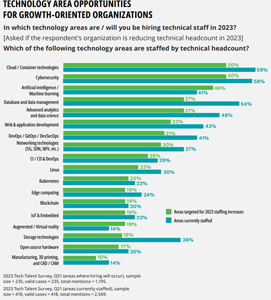News
Tech Talent: Senior Roles Get Axed, Devs/Managers Get Hired
The Linux Foundation released its annual report on tech talent, examining the current and future technology staffing requirements and skills needed within organizations.
The "2023 State of Tech Talent Report" details the impact of economic concerns and geopolitical conflicts on technical hiring plans, with more than half of organizations surveyed reporting they revised their hiring plans by freezing new positions. And, in addition to freezing new positions, organizations are cutting senior tech positions while at the same time looking to hire developers and managers.
"While senior technical roles have seen the biggest job cuts, new hiring focuses more on developers and IT management. This suggests organizations seek skilled individuals who can contribute to project implementation, management, and technical development," said the report, which is based on a global survey of over 400 hiring managers and staffing professionals from various industries and sectors.
Another takeaway concerns the type of skills employers are looking for. As might be expected, artificial intelligence and machine learning (AI/ML) skills rank highly here, but perhaps surprisingly are edged out by other most-wanted skills: "Organizations increasing their hiring in 2023 are focusing on newer technologies: cloud/containers (50 percent), cybersecurity (50 percent) and AI/ML (46 percent)."
 [Click on image for larger view.] Growth Opportunities (source: The Linux Foundation).
[Click on image for larger view.] Growth Opportunities (source: The Linux Foundation).
On the other hand, the report also said: "AI/ML is the only technology area that shows a high volume of organizations looking to increase staff and is an area where organizations prioritize technical staff hiring."
Some of the other key findings of the report as presented by the Linux Foundation are:
Some individual data points backing up those key findings include:
- Both cloud and managed service providers (65 percent) and telecommunications organizations (65 percent) are more likely to increase their technical staff in 2023.
- When unable to find suitable technical candidates, organizations trained existing employees (58 percent) more often than hiring consultants (38 percent).
- 64 percent of respondents agreed that recruitment is costly, time-consuming, and can lead to the wrong candidate and quick turnover. Almost one out of three new hires (29 percent) depart within six months of being onboarded.
- 25 percent of organizations have increased their reliance on training and certification incentives in 2023.
- Most respondents agree that certification (73 percent) and pre-employment testing (81 percent) are necessary to verify skills, addressing the challenges of finding the right candidate.
- Respondents felt that upskilling (91 percent) and certifications (77 percent) are more important than a university education (58 percent) to address technology needs.
- Training is a significant strategy for organizations; half of those reducing (52 percent) or freezing (50 percent) their hiring plan to upskill to address talent needs.
The report, designed to provides actionable insights for hiring managers and others who want to stay ahead of the curve in the tech industry, suggests that organizations need to adopt a multi-pronged approach to address their technical staffing needs, including streamlining their hiring and onboarding processes, providing comprehensive training and certification programs, and offering incentives for employees to upskill and certify.
"As the tech industry continues to evolve, it is clear that a commitment to ongoing learning and development will be crucial for individuals and organizations seeking to stay ahead of the curve," the report said.
The Linux Foundation conducted the survey Feb. 23-March 10, 2023, and promoted it through various channels including social media, the Linux Foundation and Linux.com web sites, and the Linux Foundation Newsletter.
About the Author
David Ramel is an editor and writer at Converge 360.